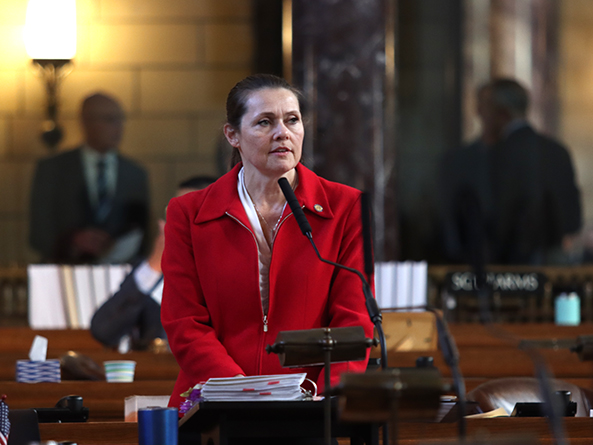School athletics, bathroom access proposal fails to advance
A bill that would restrict K-12 students’ access to school facilities and sports teams based on their sex assigned at birth stalled on general file April 5 after a failed cloture motion.

LB575, as introduced last session by Omaha Sen. Kathleen Kauth, would adopt the Sports and Spaces Act and restrict students to using school bathrooms and participating in school sports that correspond to their sex assigned at birth rather than their gender identity.
Under the bill, Nebraska public and private schools would be required to designate each group bathroom and locker room in school buildings for use by either biological females or biological males, based on chromosomes and anatomy.
Additionally, schools would be barred from permitting a biological male to use a restroom or locker room designated for biological females, and biological females would be prohibited from using a male-designated restroom or locker room.
Kauth said the bill would protect students’ “privacy and dignity” when using restrooms and locker rooms. In addition, she said, there are “immutable” differences between males and females and that forcing girls to compete in sports against boys who identify as female could put their safety at risk.
“It is extremely wrong that we are putting girls in the position to participate against boys — who are much, much stronger — against their will,” Kauth said. “Women and girls are going to start refusing to participate in sports, knowing that the cards are stacked against them when men are allowed to compete against them.”
A pending Education Committee amendment would clarify that biological female students who are taking cross-sex hormones also would be prohibited from competing against other women and girls in school sports.
Omaha Sen. Megan Hunt opposed the measure and filed numerous motions to extend debate. LB575 isn’t about protecting women’s sports, she said, but rather about discriminating against transgender youth who want to participate in school activities.
“We’re talking about 7th graders who want to run track with their friends,” Hunt said. “And then the state [comes] down to put this government-sanctioned discrimination upon them when they are just trying to run track and play soccer and have fun with their friends at school.”
Fremont Sen. Lynne Walz argued that the Nebraska School Activities Association’s gender participation policy, which most Nebraska K-12 schools currently follow, is sufficient.
“We already have an effective policy in place,” she said. “We have had it in the past, we have it today and it will be effective in the future.”
Sumner Sen. Teresa Ibach spoke in support of LB575. The current NSAA regulations give school districts individual authority to implement gender participation policies, she said, resulting in a lack of uniformity.
“What [LB]575 will allow is statewide guardrails for consistent, fair competition,” Ibach said.
Sen. Tom Brandt of Plymouth questioned how the measure would be enforced and who would pay to implement the policies outlined in LB575. He expressed concern that schools would have to build additional restrooms and find ways to determine a student’s chromosomes.
“I’m a person that wants to limit the financial responsibility of our schools,” Brandt said. “I don’t want to see any more unfunded mandates.”
After four hours of debate, Kauth offered a motion to invoke cloture, which ends debate and forces a vote on the bill and any pending amendments.
The cloture motion failed 31-15. Thirty-three votes were needed. A failed cloture motion results in debate on a proposal ceasing for the day. LB575 is unlikely to be placed on the agenda again this session.


